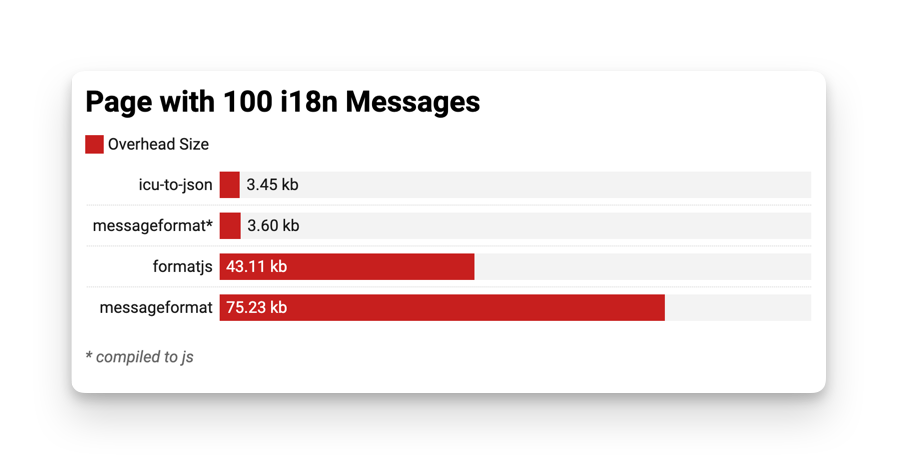Precompile i18n icu syntax translations to JSON at build time and render them at runtime
Build Time: compile("Hello {name}") → ["Hello ",["name"]]
Run Time: run( ["Hello ",["name"]], { name: "World"} ) → "Hello World"
The main goal is to boot up javascript apps with ICU translations as fast as possible for the end user.
Therefore this library provides a way to compile ICU MessageFormat strings to compressed JSON at build time and render them at runtime with a minimal runtime footprint.
- Smaller Runtime Footprint
The runtime footprint is only 1kb (minified and gzipped) - No parsing at runtime
The precompiled JSON can be rendered without any string parsing at runtime - Flexible
The runtime is able to not only return strings but also any object (aka rich text elements like JSX) - Types
The compiler has an optional feature to generate typescript types for the ICU messages and their arguments

t() function is not part of this library. It is only an example how the generated types could be used.
npm install icu-to-jsonimport { run } from 'icu-to-json';
// e.g. precompiled icu messsage:
// "Hello {name}!"
run(precompiledMessage, "en", { name: 'World' })) // Hello, World!import { run } from 'icu-to-json';
// e.g. precompiled icu messsage:
// "You have {count, plural, one {# unread message} other {# unread messages}}."
run(precompiledMessage, "en", { count: 1 })) // You have 1 unread message.Tags can be used to wrap parts of the message.
import { run } from 'icu-to-json';
// e.g. precompiled icu messsage:
// "You have <b>{count}</b> messages."
run(precompiledMessage, "en", { count: 2, b: (content: number) => `**${number}**`})) // You have **2** messages.The runtime is able to not only return strings but also richtext elements (e.g. JSX).
JSX is only used as an example here - it works with any other object as well.
import { evaluateAst } from 'icu-to-json';
// e.g. precompiled icu messsage:
// "You have <link><b>{count, plural, one {# unread message} other {# unread messages}}.</b></link>"
evaluateAst(precompiledMessage, "en", {
count: 1,
link: (content: string) => <a href="/messages">{content}</a>,
b: (content: string) => <b>{content}</b>
}) // [ 'You have ', <a href="/messages"><b>1 unread message.</b></a> ]The CLI can be used to compile ICU MessageFormat strings to JSON at build time.
# compile icu messages to json
icu-to-json src/messages.json dist/messages.json
# generate typescript types, locales and formatters from the icu messages
icu-to-json --types src/messages.json dist/messages.jsonimport { compile } from 'icu-to-json/compiler';
const precompiledMessage = compile('Hello {name}!');This library is still in early development and not yet ready for production use.
The main work is done by the @formatjs/icu-messageformat-parser, which parses the ICU MessageFormat strings and returns an AST.
The AST is then traversed and compiled to JSON by icu-to-json.
MIT


